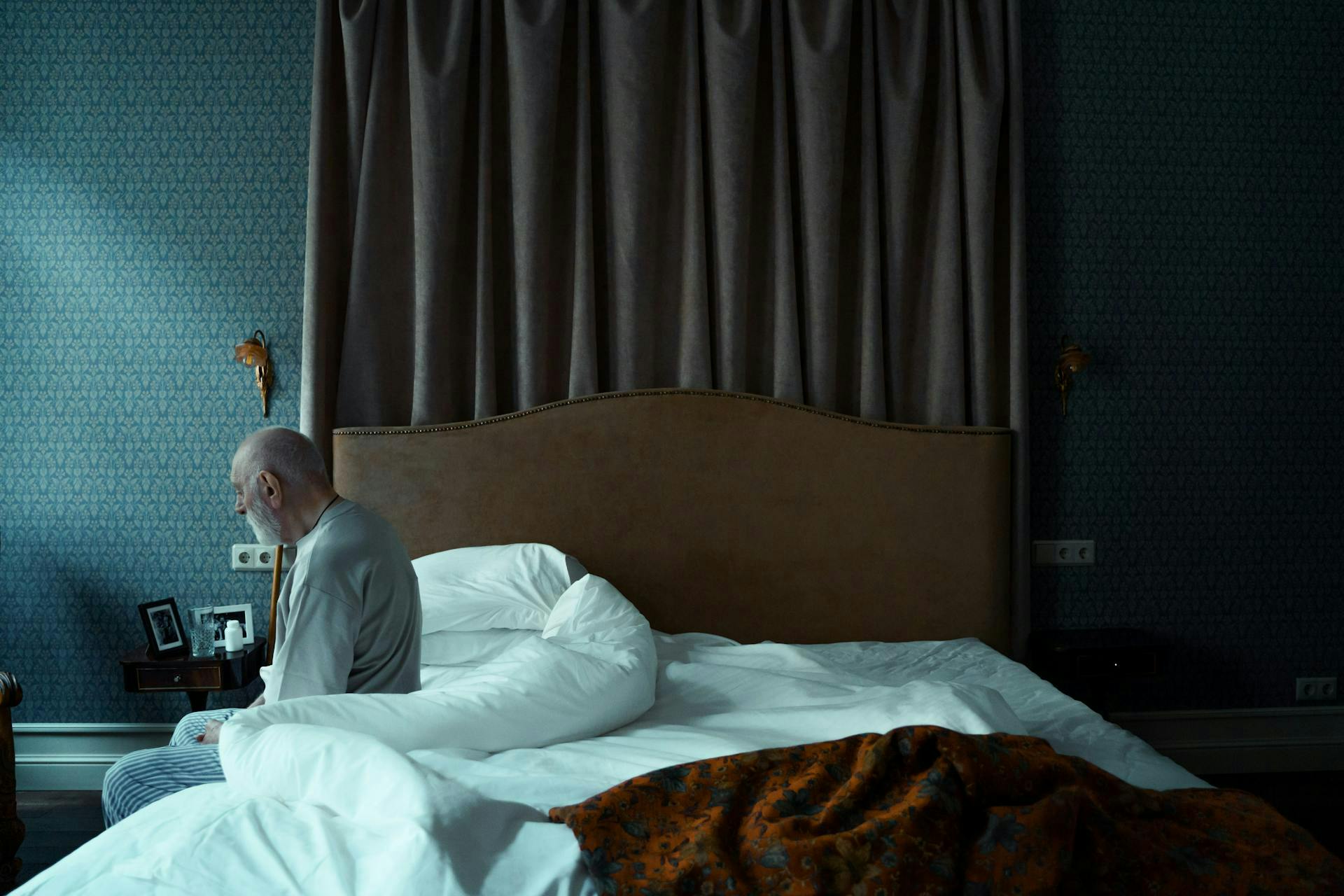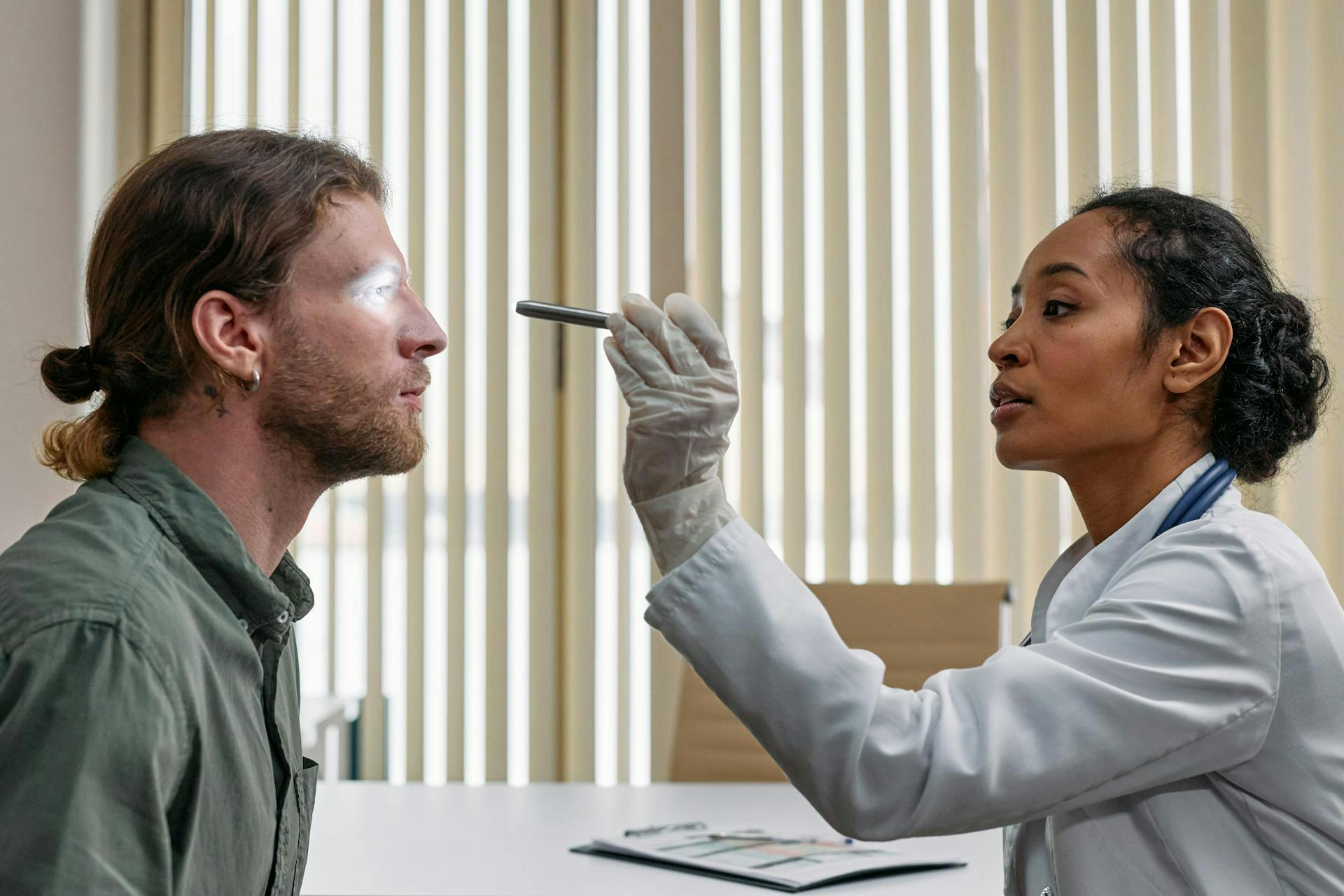What Causes Night Sweats in Men? 10 Common Reasons and How to Find Relief
By Dr. Jossy Onwude, MD
Reviewed by Dr. Daniel Uba, MD
Published Apr 28, 2025
10 min read

Waking up in the middle of the night drenched in sweat is a frustrating—and often confusing—experience. It's uncomfortable, messy, and can even be a little scary when it happens more than once. For many men, night sweats are a random nuisance that comes and goes. For others, they might signal a deeper health issue that needs attention.
If you’ve been tossing and turning, peeling off sweaty sheets, and wondering what’s going on with your body, you're definitely not alone. Night sweats are surprisingly common in men of all ages, and the causes range from completely harmless to signs of something more serious.
In this article, we'll walk you through what night sweats are, the 10 most common reasons they happen to men, when you should think about seeing a doctor, and simple tips you can start using tonight to cool down and sleep better.
What Are Night Sweats?
Night sweats are exactly what they sound like: sweating heavily while you sleep, to the point where your pajamas and bedsheets might become soaked. It's more intense than simply feeling warm or overheated. True night sweats often wake you up in the middle of the night, feeling clammy, uncomfortable, and confused.
It’s important to know that not every warm night counts as a "night sweat." Sometimes, the environment, like a hot bedroom, heavy blankets, or spicy food before bed, can cause sweating. But when you wake up dripping with sweat even in a cool room, with no clear cause, that's when it's considered a true night sweat.
Understanding the cause matters because sometimes night sweats are your body’s way of waving a little red flag to get your attention.
Common Causes of Night Sweats in Men
There are lots of possible reasons for night sweats, some more serious than others. Let’s dive into the ten most common causes.
1. Hormonal Imbalances
Hormones are chemical messengers that control nearly every function in your body, including your body temperature. When your hormones are out of balance, your body's internal thermostat can go haywire.
In men, one of the most common hormonal reasons for night sweats is low testosterone. Testosterone levels naturally decline with age, but in some men, they dip faster than normal, causing symptoms like night sweats, fatigue, weight gain, and even mood changes.
Another hormonal issue to consider is the thyroid gland. If your thyroid is overactive (a condition called hyperthyroidism), your metabolism speeds up. This can make you feel hot all the time, especially at night, leading to excessive sweating.
2. Infections
Certain infections can cause night sweats, too. Your body naturally uses fever and sweating as tools to fight off infections, but sometimes the sweating can continue even when you’re not feeling obviously sick.
Serious infections like tuberculosis (TB) are well-known for causing night sweats. HIV and certain bacterial infections, like endocarditis (an infection of the heart valves), can also lead to intense nighttime sweating.
If you’re experiencing night sweats along with other symptoms like unexplained weight loss, fever, or feeling very tired, it’s important to check in with a doctor to rule out an infection.
3. Sleep Disorders

Many people think sleep disorders are just about tossing and turning or snoring loudly, but they can cause surprising symptoms like night sweats, too.
One of the most common sleep disorders linked to night sweats is obstructive sleep apnea. In sleep apnea, your airway becomes partially blocked during sleep, causing you to stop breathing for short periods. Your body then jolts itself awake slightly to resume breathing, and this repeated stress response can trigger heavy sweating.
Night terrors, while more common in children, can occasionally happen in adults and cause sudden episodes of intense fear and sweating during sleep.
4. Certain Medications
Sometimes, the medicine you take to feel better can cause side effects you don't expect, like night sweats.
Medications known to trigger night sweats include certain antidepressants, especially selective serotonin reuptake inhibitors (SSRIs). Some hormone treatments and even over-the-counter medications like acetaminophen (Tylenol) can also cause sweating at night.
If you’ve recently started a new medication and noticed night sweats soon after, it’s worth bringing up with your healthcare provider. They might adjust your dose or recommend an alternative.
5. Anxiety and Stress
Emotions don’t just live in your mind—they show up in your body, too. Stress and anxiety can ramp up the body’s "fight or flight" response, flooding your system with adrenaline and cortisol.
When this happens repeatedly or intensely, it can cause sweating, including while you’re asleep. Men dealing with chronic stress, high-pressure jobs, or major life changes might find that their night sweats have more to do with their emotional health than with physical illness.
Managing stress through therapy, meditation, or even simple breathing exercises can make a big difference.
6. Cancers (Less Common but Important)
Before you panic, know that cancer is a much less common cause of night sweats compared to the others we’ve talked about. But it’s still important to mention.
Certain cancers, especially lymphoma and leukemia, can cause persistent, drenching night sweats. These are usually accompanied by other symptoms like unexplained weight loss, swollen lymph nodes, or fevers.
If your night sweats are intense, ongoing, and paired with these warning signs, see a doctor sooner rather than later.
7. Lifestyle Factors
Not every case of night sweats points to a major medical problem. Sometimes, it’s just about lifestyle choices.
Drinking alcohol before bed can trigger night sweats because alcohol affects the part of your brain that regulates body temperature. Recreational drugs like cocaine or MDMA (ecstasy) can also cause sweating as a side effect.
Even simple things like wearing heavy pajamas, sleeping under too many blankets, or keeping your room too warm can lead to night sweats. Fortunately, these types of causes are easy to fix once you recognize them.
8. Low Blood Sugar (Hypoglycemia)
If you have diabetes or insulin resistance, your blood sugar levels can dip during the night, especially if you take insulin or other blood-sugar-lowering medications.
Low blood sugar triggers a release of adrenaline, which can cause sweating as your body tries to bring your sugar levels back up. If you often wake up sweaty and shaky, or if you notice other signs like dizziness or confusion, it’s important to talk to your doctor about your blood sugar control.
9. Gastroesophageal Reflux Disease (GERD)
GERD, or chronic acid reflux, is usually known for causing heartburn and chest discomfort, but it can also cause night sweats in some men.
The exact link isn’t fully understood, but it's believed that the discomfort and irritation caused by acid rising into the esophagus at night may stimulate your body’s stress response, leading to sweating.
If you have frequent heartburn along with night sweats, treating your GERD could help improve your sleep quality.
10. Idiopathic Hyperhidrosis
Finally, in some cases, doctors can't pinpoint a specific cause for night sweats. This condition is called idiopathic hyperhidrosis, which simply means "excessive sweating of unknown cause."
It can be frustrating not to have a clear answer, but the good news is that idiopathic hyperhidrosis is usually not linked to a serious underlying illness. Treatments like specialized antiperspirants, medications, or even simple lifestyle changes can often help manage the sweating.
When to See a Doctor

Not all night sweats need a trip to the doctor. But some signs should prompt you to get checked out.
If your night sweats are severe, happen frequently, or are accompanied by other symptoms like fever, unexplained weight loss, fatigue, or swollen lymph nodes, it’s time to make an appointment.
Doctors can often figure out the cause through a combination of questions, a physical exam, blood tests, and sometimes imaging studies. In many cases, getting to the root cause early means treatment is simpler and more effective.
How to Find Relief from Night Sweats
Whether your night sweats are caused by a medical condition, lifestyle factors, or stress, there are steps you can take to make your nights more comfortable.
1. Cool Your Sleep Environment
Keep your bedroom cool—most experts recommend setting your thermostat between 60 and 67 degrees Fahrenheit. Use lightweight, breathable bedding and moisture-wicking pajamas made from natural fabrics like cotton. Some men even find it helpful to use a cooling mattress pad or keep a fan running near the bed.
2. Manage Stress and Anxiety
Stress management techniques like deep breathing, meditation apps, yoga, or even just talking to a friend can help lower your body's stress response. If your anxiety feels overwhelming, consider talking to a therapist for extra support.
3. Review Your Medications
If you think a medication might be behind your night sweats, don’t stop it on your own. Instead, talk to your doctor about possible alternatives or adjustments.
4. Stay Hydrated
Dehydration can make your body work harder to regulate temperature. Drinking enough water throughout the day helps support your body’s natural cooling system.
5. Monitor for Other Symptoms
Keeping a simple journal of your symptoms—what days they happen, how severe they are, what you ate, medications you took—can give you and your doctor valuable clues about what's triggering your night sweats.
Final Thoughts
Night sweats can be unsettling, but in many cases, they’re nothing to panic about. Common causes include things like hormonal shifts, stress, medications, or even a warm bedroom.
Still, because night sweats can sometimes signal more serious issues, it’s always smart to pay attention to your body and talk to a doctor if something feels off.
With the right approach, you can usually get to the bottom of your night sweats—and get back to dry, peaceful sleep.
Frequently Asked Questions
1. Can dehydration cause night sweats in men?
While dehydration itself doesn't directly cause night sweats, being dehydrated can make it harder for your body to regulate its temperature. If you're already sweating at night and not replacing those fluids, it can make symptoms worse and leave you feeling even more drained the next day. Staying hydrated during the day can support better sleep and help manage body temperature.
2. Are night sweats in men a sign of low testosterone?
Yes, they can be. Low testosterone levels (sometimes called "Low T") can disrupt the body’s ability to regulate heat, leading to symptoms like night sweats, hot flashes, fatigue, and mood changes. If you're noticing other signs of low testosterone alongside night sweats, it’s worth asking your doctor for a simple blood test to check your hormone levels.
3. Can changing my diet help reduce night sweats?
Absolutely. Some foods and drinks—like spicy meals, caffeine, and alcohol—can trigger or worsen night sweats. Eating lighter meals in the evening, avoiding spicy food close to bedtime, cutting back on caffeine, and limiting alcohol may help reduce sweating episodes at night. Staying consistent with healthy eating habits can also support hormone balance and overall better sleep.
4. How do I know if my night sweats are serious?
If your night sweats are happening regularly, soaking through your clothes or sheets, or are paired with symptoms like unexplained weight loss, ongoing fevers, severe fatigue, or swollen lymph nodes, it’s a good idea to see a doctor. These could be signs of an underlying condition that needs medical attention, and early treatment usually leads to better outcomes.
Share this article

How Women Can Gain Muscle After 50 | Science-Backed Guide
Karyn O.
Feb 13, 20265 min read

HRT and Weight Loss: What Midlife Women Should Know
Dr. Priyali Singh, MD
Feb 13, 20265 min read

Best Women’s Probiotics for Gut, Hormones & UTIs
Lilian E.
Feb 12, 20265 min read

Best-in-class care is a click away
Find everything and everyone you need to reach your metabolic health goals, in one place. It all makes sense with Meto.
Join Meto